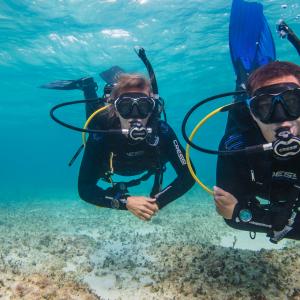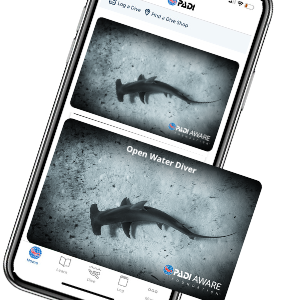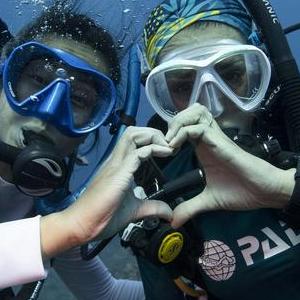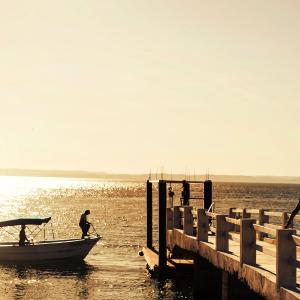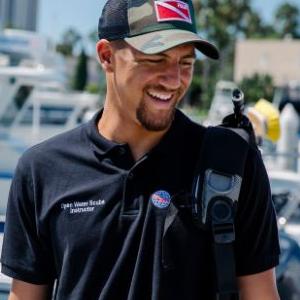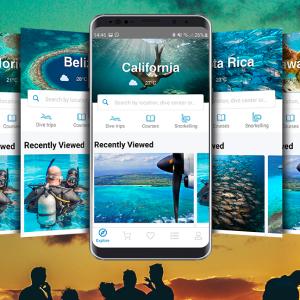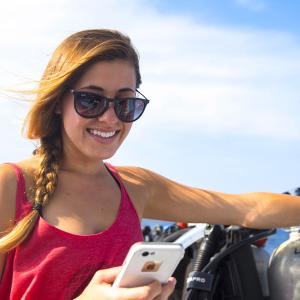FREQUENTLY ASKED QUESTIONS
HOW IS FREEDIVING DIFFERENT FROM SNORKELING OR SKIN DIVING?
Snorkeling is the casual act of putting on a mask and snorkel and looking below while floating. Snorkelers may not have any training and generally spend most of the time on the surface. Skin diving takes snorkeling a step further by adding short dives underwater. Skin divers may have training that teaches skills, such as efficient dives and snorkel-clearing. Freediving uses advanced breathing techniques and diving skills to increase depth and time underwater. Through training, freedivers learn conserve oxygen while breathholding while practicing different freediving disciplines, such as static apnea, dynamic apnea, free immersion and constant weight freedives.
HOW DO I LEARN TO FREEDIVE?
The PADI Freediver course contains three phases – knowledge development, a confined water sessions and open water sessions. During knowledge development you learn about how your body reacts to breathholding and how water pressure affects you as you dive down. You also learn about freediving equipment, important safety rules and buddy procedures.
In confined water, such as a swimming pool, you learn breathing techniques, then practice breathholds while floating (static apnea) and while swimming (dynamic apnea). You also practice basic rescue techniques and learn your role as a buddy.
During at least two open water sessions, you practice diving down while breathholding, either by pulling yourself along a line (free immersion) or duck diving head first while following a line (constant weight). You learn to gradually increase your depths by relaxing and enjoying each dive. Rescue practice is another key part of the open water sessions.
HOW LONG DOES IT TAKE TO GET CERTIFIED?
The PADI Freediver course is flexible and performance based, which means that your PADI dive shop and PADI Freediver Instructor can offer a wide variety of schedules, organized according to how fast you progress.
Knowledge development is handled through independent study with the PADI Freediver TouchTM – an interactive tablet based app. You pace yourself as you work through each topic, then complete an overall Knowledge Review, then an Exam.
There are at least three water sessions that will likely be scheduled on separate days. So, your training may take two to three days or longer. The recommended course duration is 15 hours.
During confined and open water sessions, your PADI Freediver Instructor will focus on helping you become a confident and comfortable freediver, not on how long it takes. You earn your certification based on demonstrating you know what you need to know and can do what you need to do. This means that you progress at your own pace – faster or slower depending upon the time you need – to become a competent freediver.
WHAT ARE THE REQUIREMENTS FOR LEARNING TO FREEDIVE?
The minimum age is 15 years old for the PADI Freediver course and 12 years old for the PADI Basic Freediver certification. PADI Basic Freediver is a subset program on the PADI Freediver course that only includes knowledge development and a confined water session.
All student divers complete a medical history form that asks about medical conditions that could be a problem while freediving. If none of these apply, sign the form and you’re ready to start. If any of these apply to you, your doctor must, as a safety precaution, assess the condition as it relates to freediving and sign a medical form that confirms you’re fit to dive. In some areas, local laws require all students to consult with a physician before entering the course. Download the PADI Freediver Medical History Form.
Your PADI Freediver Instructor will have you demonstrate basic water skills to be sure you’re comfortable in the water. This is a 200-metre/yard swim or 300-metre/yard swim using a mask, fins and snorkel without stopping. There is no time limit for this, and you may use any swimming strokes you want.
Any individual who can meet the performance requirements of the course qualifies for certification. There are many adaptive techniques that allow individuals with physical challenges to meet these requirements.
WHAT ARE THE DIFFERENT PADI FREEDIVER CERTIFICATION LEVELS?
PADI Freediver course – Develops the knowledge and skills for basic static apnea, dynamic apnea, free immersion and constant weight freediving from 10-16 metres/30-55 feet. When completing open water training is not feasible or desirable, students complete just the knowledge and confined water skill portion of the PADI Freediver course (6 metres/20 feet maximum) to earn the PADI Basic Freediver rating.
PADI Advanced Freediver course – Expands knowledge and skills, and with further development in static apnea, dynamic apnea, free immersion and constant weight freediving from 16-24 metres/55-80 feet.
PADI Master Freediver course – Continues knowledge and skill development with further development in static apnea, dynamic apnea, free immersion and constant weight freediving from 24-40 metres/80-130 feet.
HOW MUCH DO FREEDIVING LESSONS COST?
Compared with other popular adventure sports and outdoor activities, learning to freedive isn’t expensive. For example, you can expect to pay about the same as you would for:
- a full day of surfing lessons.
- a weekend of rock climbing lessons.
- a weekend of kayaking lessons.
- a weekend of fly-fishing lessons.
- about three hours of private golf lessons.
- about three hours of private water skiing lessons.
- one amazing night out at the pub!
For specific costs, ask at the PADI dive shop where you’d like to get certified. All PADI Freediver Centers, along with scuba Dive Centers and Resorts are independently owned and operated, and prices can vary depending on location, class size and other factors. Some questions you may want to ask are:
- Are the course materials included in the price?
- What personal freedive equipment am I required to have?
- Are there any additional fees such as a boat fee?
- How many students will be in the course?
- Where will open water training sessions take place?
WHAT GEAR WILL I NEED TO FREEDIVE?
Choosing and using your freediving gear is part of the fun. Your local PADI Freediver Center will help you find the right mask, snorkel and fins that are specifically designed for freediving. You may also want to get a freediving wet suit and weight system.
HOW DO I FIND THE BEST FREEDIVING GEAR?
There is no “best gear,” but there is the best gear for you. The freedive professionals at your local PADI dive shop are trained to help you find equipment that best matches your preferences, fit and budget.
WHERE IS THE BEST PLACE TO GET CERTIFIED?
All PADI Freediver Centers worldwide adhere to the same training standards, so no matter where you are there’s likely a PADI Freediver Instructor ready to teach you. Decide where the best place for you is by contacting your local PADI dive shop to find out what options are available, ask friends and family, or check out the destinations on ScubaEarth®.
MY EARS HURT WHEN I GO TO THE BOTTOM OF A SWIMMING POOL OR WHEN I DIVE DOWN SNORKELING. WILL THAT PREVENT ME FROM BECOMING A FREEDIVER?
No, assuming you have no irregularities in your ears and sinuses. The discomfort is the normal effect of water pressure pressing in on your ear drums. Fortunately, our bodies are designed to adjust for pressure changes in our ears – you just need to learn how. If you have no difficulties adjusting to air pressure during flying, you'll probably experience no problem learning to adjust to water pressure while freediving.
WILL A HISTORY OF EAR TROUBLES, DIABETES, ASTHMA, ALLERGIES OR SMOKING PRECLUDE SOMEONE FROM FREEDIVING?
Not necessarily. Any condition that affects the ears, sinuses, respiratory or heart function, or may alter consciousness is a concern, but only a doctor can assess a person’s individual risk. Doctors can consult with the Divers Alert Network (DAN) as necessary when assessing fitness to dive. Download the PADI Freediver Medical History Form to take to your doctor.
WHAT ARE THE MOST COMMON INJURIES OR SICKNESSES ASSOCIATED WITH FREEDIVING?
Sunburn, seasickness and dehydration, all of which are preventable, are the most common problems freedivers face. Injuries caused by not equalizing ears do occur, but these can be avoided by using proper technique and returning to the surface if your ears are not equalizing easily.
I AM CURRENTLY CERTIFIED AS A FREEDIVER THROUGH ANOTHER ORGANIZATION. HOW CAN I BECOME A PADI FREEDIVER?
As a freediver certified through another training organization, you can enroll in the next higher level in the PADI Freediver system after a skills and knowledge assessment by a PADI Freediver Instructor. The level you can enroll into depends on your current certification. Check with your PADI Regional Headquarters to confirm.
STILL HAVE QUESTIONS?
Please contact your local PADI Dive Center or Resort.

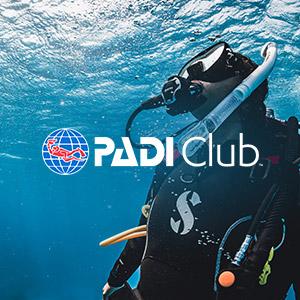
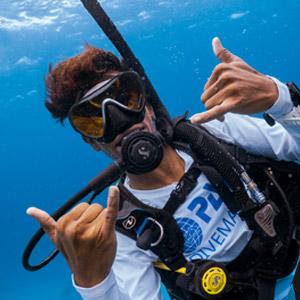

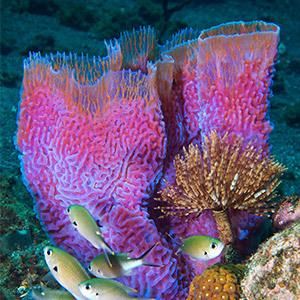
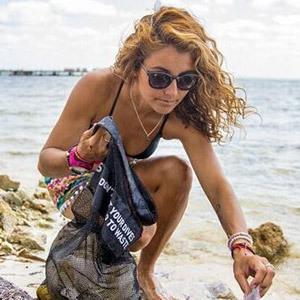

 Marine Debris
Marine Debris
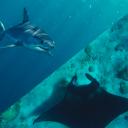 Shark & Ray Protection
Shark & Ray Protection
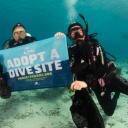 Adopt The Blue
Adopt The Blue


